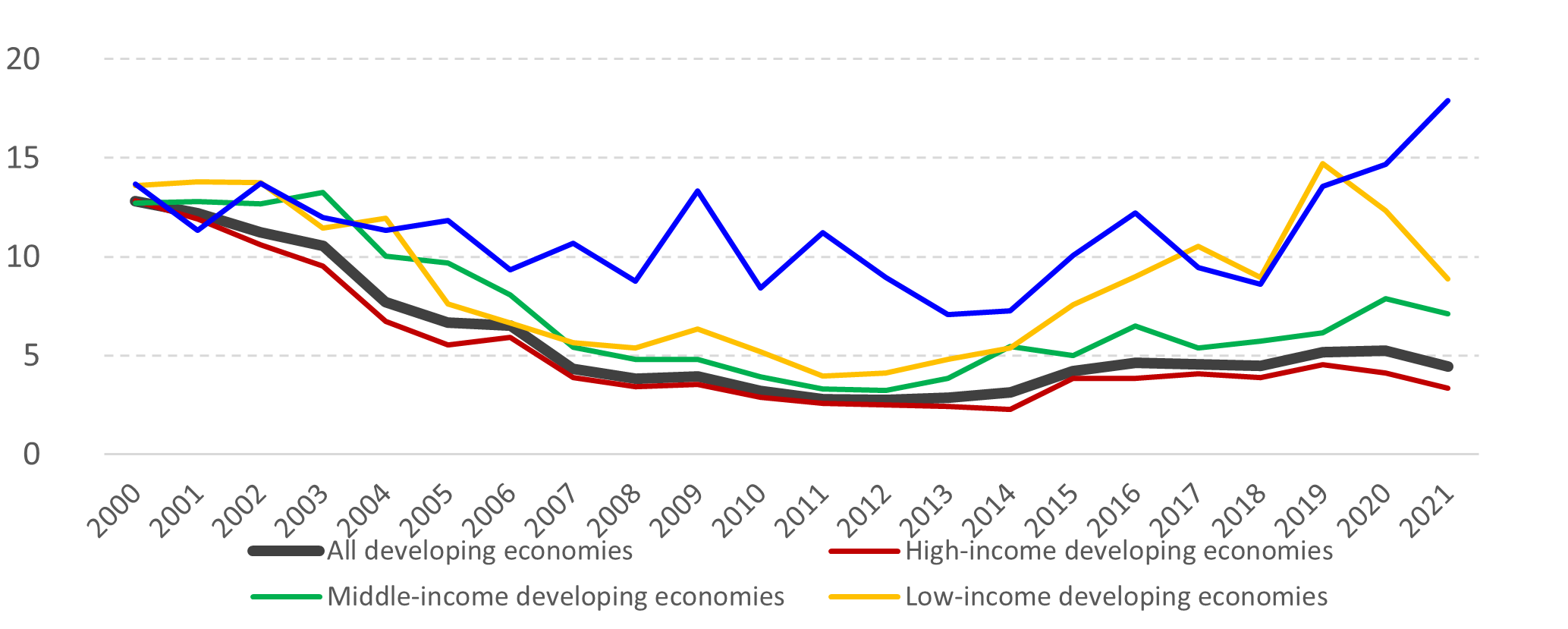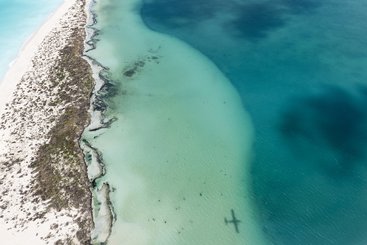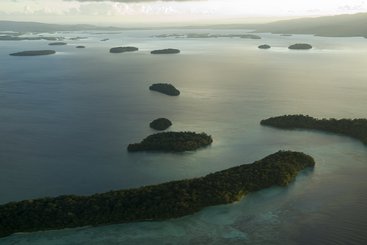Financial sustainability is essential for all states, but especially SIDS. Indeed, countries are classified as SIDS because size-related constraints and remoteness make financial stability difficult to achieve. Successes are perpetually under threat. Tourism is highly volatile, and alternatives like financial services and citizenship-by-investment programmes have been heavily criticised by large states. SIDS need a new economic model to ensure their prosperity in an uncertain future.
SDG progress under threat
SDG indicator 17.4.1 on debt sustainability has been sending alarming signals on SIDS’ financial sustainability. The debt service-to-exports ratio has stabilised elsewhere, but continues its dizzying ascent in SIDS, reaching 18% in 2021, twice as high as low-income countries.
This spectacular rise is driven by an increase in external financing and a drop in domestic resource mobilisation. The result is high levels of debt distress in SIDS.
The multilateral system to the rescue?
The “breathing space” on debt repayment pledged by development partners has not materialised. At the same time, export earnings from tourism collapsed during COVID-19, and the sector now faces considerable challenges, including the turmoil currently engulfing the aviation sector.
Despite these adverse conditions, with high levels of GNI per capita, many SIDS are ineligible for concessional finance, debt relief and/or official development assistance (ODA). Several SIDS are scheduled to graduate out of LDC status (Sao Tome and Principe, Solomon Islands, Kiribati and Tuvalu) in the upcoming years or have just graduated from the OECD DAC recipient list (Antigua and Barbuda and Palau) .
Most SIDS are net importers of energy and food, and soaring fuel and commodity prices due to the war in Ukraine will add further pressure on their current accounts - and hence their ability to mobilise funds domestically and invest in much-needed resilience projects. With most SIDS located in the tropics and climate change bringing higher intensity tropical storms, there is no time to waste.
Debt distress is just the tip of the iceberg. Underneath these macroeconomic indicators lie a complex set of economic, social and environmental vulnerabilities that impact peoples’ lives. Debt repayments drastically reduce the amounts of funds available to address challenges in infrastructure, health and education. Underinvestment in infrastructure and services in SIDS is a particular problem. Frequent acute external shocks – from the 2008 financial crisis to Covid-19 and its aftermath- call into question the sustainability of SIDS’ economic development models.
Reforming finance for sustainable development in SIDS
SDG Goal 17 speaks to strengthening the means of implementation and revitalization of global partnerships for sustainable development. For SIDS to make progress, a substantial shift in external financing options is needed. The most critical areas for progress are:
- Inclusion of vulnerability criteria in determining eligibility for concessional finance, ODA and debt relief – advancing the Multidimensional Vulnerability Index.
- Ramping up efforts by development partners to help SIDS design, issue and back up green and blue bonds, with the aim of scaling up sustainable financing from private investors.
- Widespread use of debt-for-climate swaps to help SIDS invest in reducing greenhouse gas emissions and adapt to climate change.
- A new emission and/ or rechanneling of Special Drawing Rights (SDRs). Cabo Verde, Sao Tome & Principe, Maldives, and Jamaica have already extensively used the historic allocation of August 2021. Others can benefit.
- And most ambitiously, the current debt-climate and food crisis may underpin a case for a new wave of debt forgiveness.
RESI researchers and experts are poised to take these agendas forward. We will provide insights and analysis, and nurture the discussions and policy innovations needed to improve the financial sustainability of SIDS and generate space for resilient, long-term investments. Find out more about RESI.




